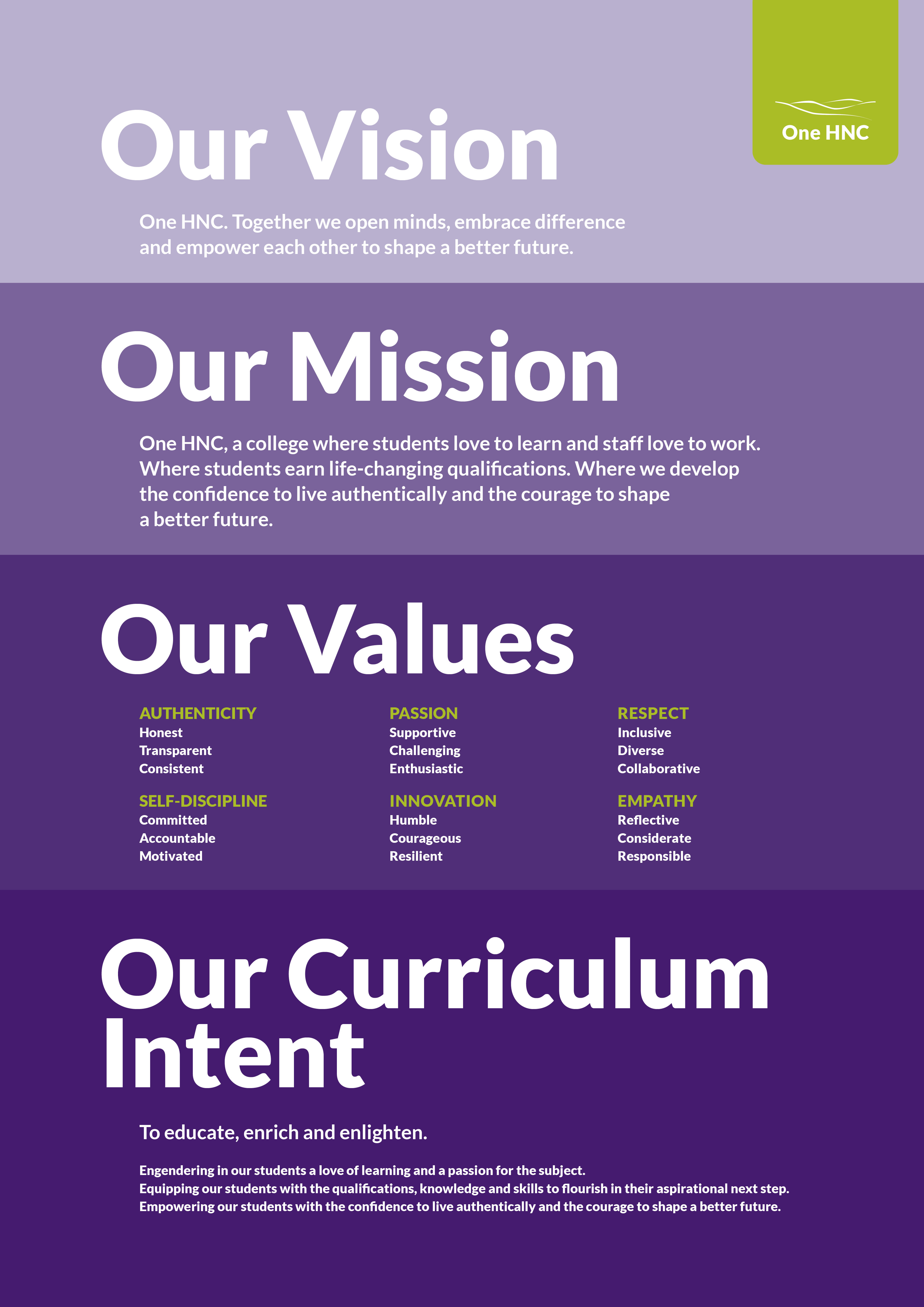OneHNC Team Culture: Only We in HNC
In this section you can learn more about the College’s staff team culture.
One HNC Team Culture
All HNC staff proactively participate in achieving our shared purpose through upholding our team culture. Our staff are authentic, their words and actions consistently align with the College’s values. HNC staff put the needs of the College community, the student experience, their education and outcomes, at the heart of their decision-making. We play our part in translating the College’s vision into a lived daily reality and seek to make a positive contribution in accordance with our role. We choose to be responsible for upholding the College’s culture, even when this requires us to challenge behaviour and communicate candidly with students, staff and other stake holders.
HNC’s Vision, Mission, Values and Intent

Connected Autonomy: Only We in HNC
HNC staff know that we can only achieve our vision through consistent, coherent, team action. Our staff culture is built on the four pillars of shared purpose, trusted empowered teams, humble and adaptive, and courageous leadership.

Shared Purpose
- Every decision must pass the acid test of supporting the College’s vision, mission and values.
- Every curriculum decision must pass the acid test of supporting one (and ideally more than one) element of the College’s curriculum intent – to educate, enrich and enlighten.
- Cultural alignment: The College’s vision, mission and values imbue everything that teams do and say because staff are aligned and intrinsically motivated to achieving this shared purpose.
- All staff feel closely connected to the College’s vision, mission and values and know that their contribution to the collective effort is essential. Staff don’t come to work for easy, they come to work for agency and impact.
Trust and Empowered
- All staff have a growth mindset; they understand that every learning process will involve setbacks and failures.
- Staff openly and honestly share both their successes and set backs; they proactively seek and offer support.
- Decisions are made and implemented at the most local level possible; only those decisions which cannot be made at a local level are taken at a higher level. Staff take professional responsibility for their decisions.
- Frequent opportunities are made to keep teams connected to the College’s vision and mission; staff are present to the powerful positive impact of their collective endeavours.
- We publicly celebrate staff who embody the College’s values.
- Self-regulating, hard-working, high performing teams: All staff own the College’s values and standards, they hold themselves and colleagues to account if their behaviour and standards do not meet the College’s expectations.
- Staff are highly effective team players; they are humble, hungry for the success of the College, hard-working and emotionally intelligent.
Humble and Adaptive
- Proactive identification and prioritisation of areas of the College which require a process of adaptive change. Adaptive change led in the knowledge that some staff may find the process unsettling.
- Proactive engagement with the external environment; regular horizon scanning and identification of opportunities and challenges.
- Staff are reflective, adaptive, open-minded, outwards facing and prepared to learn from others.
- A culture of mutual learning and growth; ideas evaluated and valued solely on the basis of their capacity to help the College better achieve the vision.
Courageous Leadership
- Staff are empowered to make decisions and take action; push the authority to the person best placed to make the decision, rather than pushing the information to the authority for approval.
- Leaders and managers embody the College’s values, they ‘walk the walk’.
- Leaders and managers know that making the College’s vision a reality is a whole team effort - “only we in HNC”.
- A culture of candid communication built on trust and mutual respect. Constructive feedback is provided, professional dialogue is ongoing and permeates the fabric of the College.
- Staff view feedback as an opportunity to develop and improve their professional practice; they don’t feel threatened or become defensive when they are challenged to adapt and improve.
- Leaders support and challenge staff; set-backs and mistakes are opportunities to learn and grow, not a chance to attribute blame.

“The diverse curriculum at HNC really helps students to achieve their ambitions. Within Science we offer both A Level and Applied qualifications, and this genuinely has opened up a world of opportunity for students seeking careers in the STEM sectors. The diversity of our curriculum is something that makes HNC an exciting place to work.”Vicky Close, Enrich Lead and Teacher of A Level Textiles